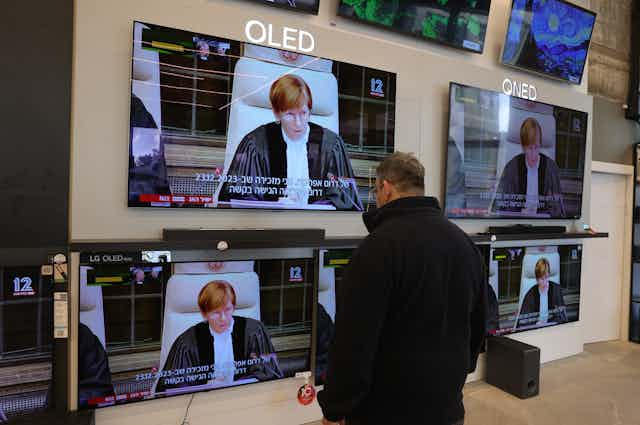In a landmark decision – and with the whole world watching – the International Court of Justice in The Hague has ordered Israel to “take all measures within its power to prevent the commission of acts of genocide” in Gaza and to allow desperately needed humanitarian aid to enter the territory.
But the court’s “provisional measures” in the case brought by South Africa at the end of December stop short of ordering a ceasefire.
In a blow to Israel, which had asked the court to throw the case out, the ICJ accepted South Africa’s arguments that it had jurisdiction over the case. It required Israel to prevent its armed forces committing any acts covered by the 1948 Genocide Convention “with immediate effect”.
That the court has found that Israel’s actions in Gaza are plausibly genocidal is damning. The decision has implications for Israel in its continued bombardment and siege of Gaza. But it also has implications for Israel’s allies in their political and material support of Israel’s actions and for other states in their international relations with Israel.
The headline of this case must be that the ICJ has accepted that there is a plausible case that Israel has been committing genocide in Gaza. But for Palestinians living there it is the order that Israel must “take immediate and effective measures to enable the provision of urgently needed basic services and humanitarian assistance to address the adverse conditions of life faced by Palestinians in the Gaza Strip” which will have the most immediate affect.
In adopting this provisional measure, the court dismissed as insufficient Israel’s purported efforts to “address and alleviate the conditions faced” in Gaza.
But the absence of an order to Israel to suspend its military operations in Gaza – the first of the list of provisional measures requested by South Africa – has been greeted with disappointment. South Africa had argued that a humanitarian ceasefire was the only way to alleviate the humanitarian crisis.
Legal battle
South African lawyers filed an application before the court instituting proceedings against Israel on December 29. It charged that Israel, by committing acts of genocide against Palestinians in Gaza, failing to prevent genocide, and failing to prevent or punish incitement to genocide, is in violation of its obligations under the genocide convention.
South Africa requested a number of interim measures, aimed at protecting Gaza’s population from irreparable harm. Public hearings were held on January 11 and 12 2024, during which lawyers for South Africa and Israel set out their arguments.
Read more: Gaza war: how South Africa's genocide case against Israel is shaping up
By delivering its list of provisional measures before the end of January, the court has acted quickly, given the urgency of the situation in Gaza.

In order to initiate this process, the court first had to establish there was sufficient evidence that it had jurisdiction to hear the case. It upheld the existence of a dispute between South Africa and Israel under article 9 of the genocide convention and ruled that the acts and omissions alleged by South Africa appeared capable of falling within the provisions of the convention.
The ICJ also confirmed that South Africa’s standing to submit the dispute to the court flowed from states’ obligations to prevent and punish genocide.
Risk of genocide
Genocide, the so-called crime of crimes, constitutes certain “acts committed with intent to destroy, in whole or in part, a national, ethnic, racial or religious group, as such”.
South Africa argued that Israel is breaching the UN convention on genocide by “killing Palestinians in Gaza, causing them serious bodily and mental harm, and inflicting on them conditions of life calculated to bring about their physical destruction”.
The court determined that the the 2 million Palestinians in Gaza constitute a substantial part of the Palestinians – a protected group under the definition of genocide.
Before it could determine any provisional measures to be taken by Israel, the ICJ had to show, as argued by South Africa, that the Palestinians in Gaza have a right to be protected from acts of genocide. This meant that the court had to reach some determination as to whether acts and omissions by Israel were plausibly genocidal.
This is one of the most damning parts of the decision for the Israeli government. The court provided a grim account of the facts on the ground for the Palestinians in Gaza. It summarised that by day 109 of the conflict, 25,700 Palestinians had been killed, more than 63,000 injured, and approximately 1.7 million internally displaced.

With reference to evidence provided by UN bodies and the World Health Organization, the court summarised the catastrophic levels of hunger, an unfolding public health disaster and what it referred to as an essentially “uninhabitable” Gaza.
The court put these facts into political context by referring to statements of Israeli political leaders, including a statement made by defence minister, Yoav Gallant, in October, that Israel would impose a complete siege on the territory because it was fighting “human animals”. In capturing this snapshot of the facts and the circumstances, the court was able to determine that there is a plausible case that Israel is committing acts of genocide.
Unsurprisingly, then, in light of the urgency and the “real and imminent risk” to the Palestinians, the court was able to initiate provisional measures.
Beyond the headline provisional measures, the court has also ordered Israel to take all measures “to prevent and punish the direct and public incitement to commit genocide”. Israel must prevent the destruction of evidence related to allegations of acts of genocide and it must, on the procedural side, submit a report to the court within a month on the measures that have been taken to comply.
But it’s important to note that the ICJ has no enforcement powers. Two years ago it ordered Russia to cease its invasion of Ukraine. That war continues unabated.

